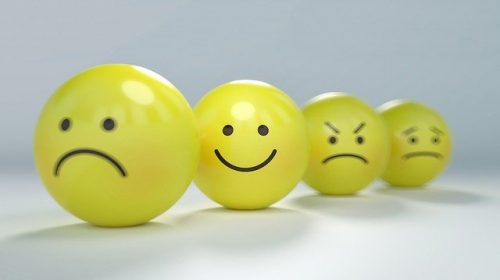
Talking to my childhood friends and family would let you know that I was the most fearless kid in our neighborhood back then. Though I could not remember it, my mother said that I did not cry when she left me at the daycare center for the first time. Meanwhile, my first memory was of me in the playground, standing up for a friend who got bullied for having lesbians as parents.
When I entered elementary school, my fearlessness grew. Many of my peers could not go home independently, even if the school were in the same neighborhood that we lived in. At one point between first and second grade, I assured my parents that I could safely find my way home by asking them to follow me from school. They drilled stranger danger in my head ever since I could recall, and we had a tight-knit community, so they often allowed me to commute by myself.
If there were one thing that could frighten me instantly, my loved ones would tell you that it’s a mime artist. Clowns, magicians, or people in realistic Halloween costumes – I never cared for them. But if I ever got a glimpse of a mime artist, even if they were a few meters away, I would undoubtedly retreat and make sure never to go back there.
Reasoning
In reality, I did not have a shady encounter with a mime artist. They were not commonly found in the suburban area, so I only saw one when my parents surprised me with a trip to New York City when I was nine years old.
We were roaming the streets at the time, and my parents were busy telling me about all the buildings there when I saw a small crowd gathering in the distance. I pulled Mom and Dad towards their location, curiosity about what they were ogling. I regretted doing that up to this day because I had to watch a large man in black-and-white clothes feel up an invisible wall and go through an invisible door without any expression on his face. The fact that he had white makeup all over him did not make things better.
When I coaxed my parents to go in another direction, we passed through a street filled with what I did not know back then as human statues. I mean, they were all bronzed and still! My father thought it was fun to ask me to drop a dollar in front of one, but I was scared out of my mind when it started moving like the mime artist I just ran away from. While they were not the same people and their clothes were different, they both had expressionless faces. It isn’t very pleasant to admit it, but it was the longest time I cried over something.
Digging Deeper
My strong aversion towards mime artists continued as I grew up. Whenever my parents talked about out-of-town trips, I made sure to find places where I had the least chance of coming across one.
In hindsight, it could be because facial expressions gave us a glimpse into others’ real emotions. For instance, a quick pout followed by a forced smile indicated that someone masked their annoyance or irritation. Similarly, a wide grin meant that they were beyond happy or excited. But a poker face? It’s scary.
To explain the necessity of expression in people’s lives, I put together a list of frequently asked questions involving the subject below.

What is an emotional expression in psychology?
The emotional expression refers to how you show how you feel towards other people or different situations verbally or nonverbally.
Examples of verbal expression:
- Hugging
- Kissing
- Saying, “thank you.”
Examples of nonverbal expression:
- Smiling
- Frowning
- Opening mouth in shock
How can facial expressions influence emotions?
Your facial expressions typically reflect your emotions, but they can also influence the latter. For instance, when you smile despite your problems, you may feel sad less and less. But when you always frown, you may become short-tempered and upset about everything.
How does emotion affect attention?
Happiness and all the positive emotions tend to make you more attentive than ever. You notice everything; you remember everything. However, your attention dips when you are sad, jealous, or angry since that’s where all your focus goes.
What are the healthy expressions of emotions?
Expressing happiness, cheerfulness, and other positive emotions is not a problem. When you smile and laugh, it influences the people around you to do the same. But the issue appears when it comes to expressing your negative emotions, especially if you usually have no filter and blurts out whatever’s on your mind.
Here are examples of healthy emotional expressions:
- If someone angers you, wait until you are calm enough to talk before letting them know about it. Some people let at least a day or two pass so that they don’t end saying words that they can no longer take back.
- If you’re in a restaurant, and a waiter takes forever to bring your order, you can ask them politely to hurry up instead of making a scene. Although the latter is useful for getting the job done, the former may make the waiter apologetic and serve you better on your next visit.
How people express their emotions?
People typically express their emotions through facial expressions. A simple frown, curt smile, or excessive pouting indicates that you don’t like what you see; a huge grin entails loving it.
Often, facial expressions also come with corresponding words or body language. For the former, you may shake your head and say, “No, thank you.” For the latter, you may clap or jump up and down to express your enthusiasm and appreciation.
What are emotional display rules?
Emotional display rules are practically the norms in your location when it comes to expressing your emotions. One clear example of that is the public display of affection. In religious countries, people frown upon couples who hug and kiss each other in public. They also care deeply if a parent scolds a child at the park or any crowded place. Still, in more liberated countries, kissing, hugging, or even yelling folks hardly attract anyone’s attention.

What are the seven emotions?
- Happiness
- Disgust
- Fear
- Anger
- Contempt
- Surprise
- Sadness
Do emotions follow behavior and facial expressions?
No. Emotions influence facial expressions – when you are upset, you cannot help but frown or burrow your eyebrows. Consequently, you can school your facial expressions to change your emotions – when you push yourself to smile through the pain, it may eventually feel less painful.
Meanwhile, the behavior is also a byproduct of emotion, not the opposite. If you act unkindly towards someone, it is because you are thinking unkindly about someone.
Do facial expressions reflect inner feelings?
Yes. According to studies, our facial expressions fleet multiple times until we decide how we feel about something. Some people want to hide their inner feelings at times, but their facial expressions tend to give them away.
Do emotions affect memory?
Yes, emotions affect memory. The general rule is that the happier you are, the clearer your mind is, and the better your concentration becomes. Thus, it may be more effortless for you to remember stuff than an upset individual.
When you are angry or sad, your memory may still work, but you may only recall the cause of your anger or sadness. That is not healthy at all.
What factors influence your emotions?
The following factors can influence your emotions:
- Culture: Culture often dictates how individuals react to certain situations. For instance, in many Asian countries, it has been common for couples to avoid showing physical affection, even if they are already married. This has only changed recently.
- Gender: Women tend to experience emotions more intensely than men. It is perhaps due to how women are supposed to behave a bit more emotional than men according to social norms, while the latter are expected to keep their cool at all times.
- Social Status: Social status suggests that people in the higher strata may be happier and more easygoing than those near or below the poverty line. However, people from all walks of life deal with different problems every day; that’s why it is challenging to assess its distinct effects.
- Stress: Stress makes everyone feel negative emotions in general. It also shortens your patience and causes you to express your feelings and thoughts more aggressively than usual.

How does emotion affect personality?
When you are a highly emotional individual, you may seem like a weakling or crybaby in the eyes of other people. When you let negative emotions get the better of you, people will think that you are moody, mean, rude, and short-tempered.
If you want to improve your personality, you need to evaluate your emotions and figure out if you express them correctly.
What is the difference between emotions and feelings?
Emotions are involuntary reactions that a person’s brain causes after they deal with a situation. For instance, if you catch your boyfriend lying to you, your face scrunches up on automatic, and tears may flow down your cheeks. Some people even start yelling profanities towards the cheater or throw punches at them.
Once the emotions calm down, the person starts to feel hurt and angry about the betrayal. You get feelings when you become aware of your feelings and manage to put a name on them.
How can I express my emotions better?
To explain this better, let’s say you are facing a major crisis as a coworker deleted the documents you need for a presentation, and it will take a while before you can get a copy.
The first thing you must do is close your eyes and take deep breaths – as if you are doing mindfulness meditation. You may be seething in anger upon knowing your coworker’s mistake, but confronting them and yelling at them will do you no good. It just means that your emotions are controlling you, and that’s not acceptable.
Instead, you can try naming such emotions so that they turn into feelings – an indication that you are conscious of them now. It is not wrong of you to be angry, sad, or betrayed by what your coworker did; you need to calm yourself to avoid more conflicts.
When you are ready, please open your eyes and think of letting the coworker know that you didn’t appreciate what they did. If you are still angry after that, you can write your feelings in a journal and burn them, go to the gym, or do any activity that will allow you to release your anger.
Is expressing your emotions really helpful?
Yes, expressing your emotions is genuinely helpful, considering hiding them can lead to mental disorders. It is understandable if you feel ashamed to show your feelings sometimes, especially when they are not positive, but you need to do so at some level to prevent them from chipping away at your mental health.
Final Thoughts
Life becomes more bearable than ever when you know how to express yourself through verbal or non-verbal means. If you want to increase your chances of staying mentally healthy, you should not be as expressionless as a mime artist.